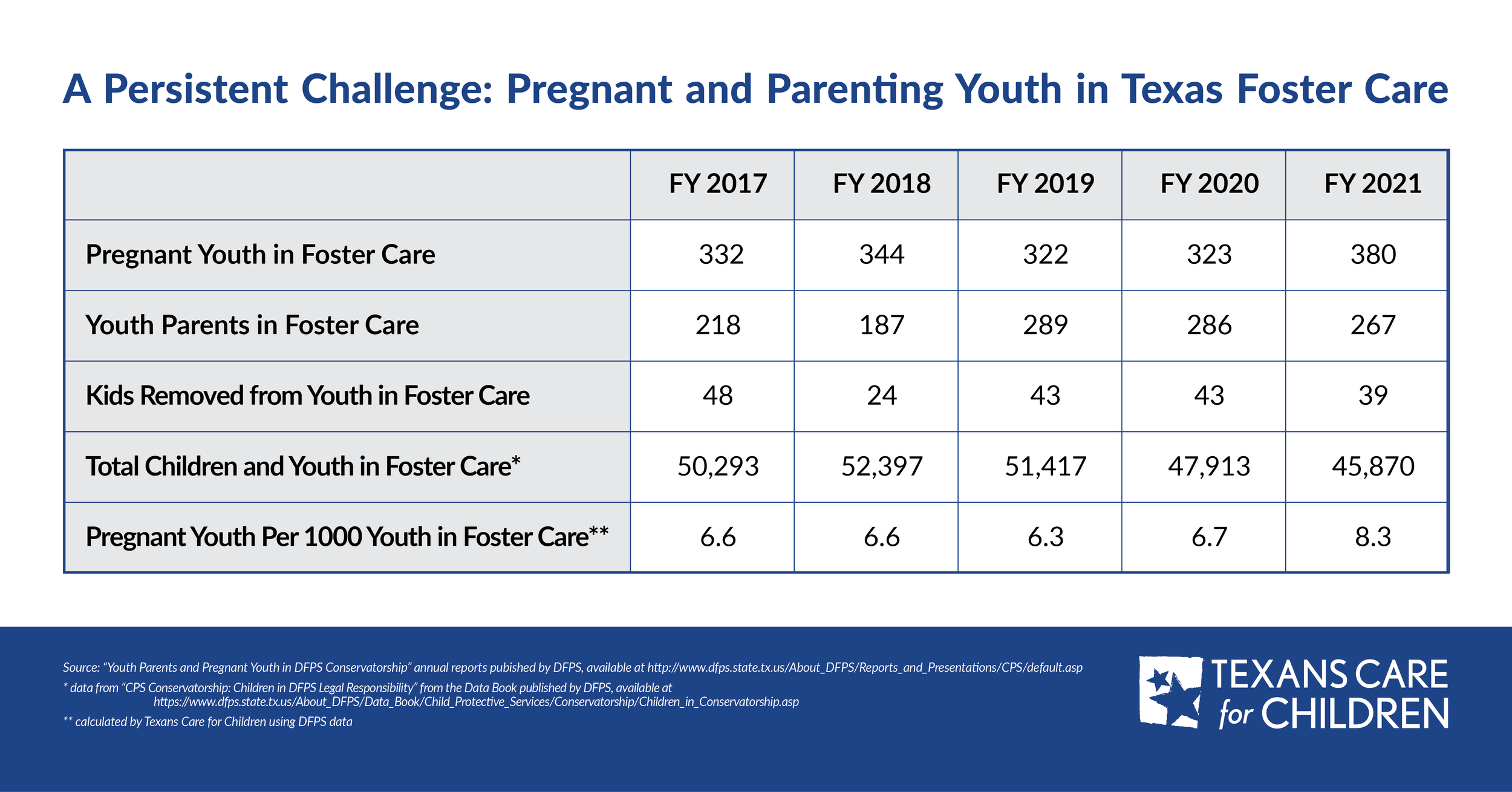For Immediate Release
Contact: Peter Clark, 512-473-2274, pclark@txchildren.org
Children’s Advocates Urge the Legislature to Take Action
Austin – A new report shows that Texas faces a persistent challenge with teen pregnancy in foster care, with a greater proportion of children in Texas foster care experiencing a pregnancy in 2021 compared to each of the previous four years. The report on Fiscal Year 2021, published by the Texas Department of Family and Protective Services, shows that 380 Texas youth in foster care were pregnant, 267 youth in foster care were parents of their own children, and 39 children were removed by CPS from youth who were still in foster care themselves.
“Policymakers need to address this challenge so youth in foster care can stay healthy, succeed in school, and recover from trauma rather than experiencing the new trauma of CPS removing their baby because they didn’t get the support they needed,” said Kate Murphy, Senior Policy Associate for Child Protection at Texans Care for Children and co-author of a 2018 report on pregnant and parenting youth in Texas foster care. “The Legislature should make sure youth in foster care are getting the support they need to wait to become parents when they are ready and, for youth who have a baby while in foster care, the support to have a healthy pregnancy and safely raise a healthy baby.”
DFPS published the new report as Texas is facing a critical shortage of safe and supportive placements for youth in foster care with complex needs, leading to youth sleeping in motels and unlicensed facilities. The report also comes as state leaders are considering the foster care recommendations from an Expert Panel convened after a federal judge found that the sexual abuse, physical abuse, and other dangers in the state’s long-term foster care system violate the constitutional rights of Texas youth.
Drawing on the data published in the last five annual DFPS reports on pregnant and parenting youth, as well as data on the overall population of children in Texas foster care, Texans Care for Children found that youth in foster care were more likely to be pregnant in 2021 compared to any of the previous four years. For every 1,000 youth in foster care, 8.3 were pregnant in 2021, compared to a range of 6.3 to 6.7 from 2017 through 2020. Note that the data compare the annual pregnancy rate for youth of all ages in foster care rather than the teen pregnancy rate specifically.

“DFPS deserves credit for working to address this challenge, and the Legislature took some important steps in 2021 as well,” said Ms. Murphy. “However, there’s clearly more work for the Legislature to do to support these young Texans and their babies and ensure the state is accepting its responsibility as the temporary parent of youth in foster care. We’re talking about a relatively small number of youth in foster care who become pregnant each year, so Texas could provide them and their babies with ample support if policymakers make it a priority.”
Positive steps that the Legislature has taken recently in collaboration with children’s advocates include:
- Passing HB 475 in 2019 to provide more support for pregnant and parenting youth in foster care;
- Passing SB 1896 in 2021 to direct DFPS to develop foster care placements and services for pregnant and parenting youth in foster care;
- Passing HB 700 in 2021 to improve support for older youth in foster care, including ensuring all youth 17 and older in foster care understand and make decisions related to their health care through a medication management program supervised by a physician and caregiver;
- Passing SB 1059 in 2021 to ensure continuity of Medicaid coverage for former foster youth; and
- Ensuring pregnant and parenting youth are able to receive services funded by the Family First Prevention Services Act of 2018 (FFPSA).
However, several important bills to support pregnant and parenting youth and their babies did not pass during the 2021 legislative session, including:
- HB 2490, which would have allowed minors to consent for home visiting services;
- SB 662/HB1413, which would have funded mental health peer support for youth and young adults;
- HB 608, which would have improved data and reporting on pregnant and parenting youth in foster care; and
- HB 4265/SB 2104, which would have funded family partners who could potentially support pregnant and parenting youth in foster care just as they currently support caregivers for children receiving mental health services.
Texans Care for Children is calling on the Legislature to make these bills a priority during the 2023 legislative session. We also urge the Legislature to examine the implementation of FFPSA over the interim and determine whether changes need to be made to eliminate barriers to connecting pregnant and parenting youth with evidence-based services or to amplify the state’s investment in this population. Finally, we are urging the Governor, Legislature, and DFPS to work together to quickly implement the recommendations of the Expert Panel for addressing the ongoing foster care crisis, which can support pregnant and parenting youth and will support youth in foster care, generally.



